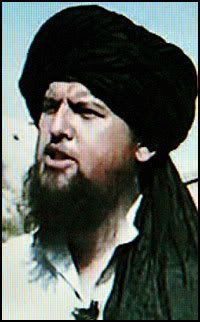Exclusive:
| Monica Whitlock |
This revelation may prove particularly embarrassing for the BBC in light of the recent arrest, detention and October 14th conviction by a Tajik court of Urunboy Usmonov, the BBC's Central Asia correspondent. The allegations against Usmonov, who was tortured while in custody, were based solely on his reporting for the BBC on the activities of the banned Islamist organization, Hizb ut-Tahrir.
Whitlock, who now works as an independent producer of radio and film programs, has written two well-regarded books on Central Asia and is considered an expert on the region. Whitlock's writings are characterized by a heartfelt reverence for Central Asia and its people.
Whitlock was expelled from Uzbekistan in 2005 after the BBC aired her first-hand reports [audio] of Islam Karimov's brutal crackdown on protestors in Andijan City Without Whitlock's reports it is likely that the full scope of the massacre would not have become as widely known in the West. Last year Whitlock produced and appeared in a documetary on the Andijan masacre. She also produced radio programs on the anniversary of the massacre and on a group of Andijan survivors living in Sweden.
Whitlock was expelled from Uzbekistan in 2005 after the BBC aired her first-hand reports [audio] of Islam Karimov's brutal crackdown on protestors in Andijan City Without Whitlock's reports it is likely that the full scope of the massacre would not have become as widely known in the West. Last year Whitlock produced and appeared in a documetary on the Andijan masacre. She also produced radio programs on the anniversary of the massacre and on a group of Andijan survivors living in Sweden.
It therefore may come as a surprise to Central Asia watchers that when the brother of a fugitive Uzbek Islamist confided to Whtlock his brother's location she shared this information with the U.S. Embassy in Tashkent. The May 1st 1997 cable reports that, according to Whitlock, "the Islamic militant Takhirijon has surfaced in Peshawar," and identifies his brother as the source of Whitlock's information. The WikiLeaks cable also indicates that Whitlock passed on information about the separate location of Takhirijon's chief deputy, Jumaboy Namangani. The cable requests that Whitlock not be revealed as the source of the information through the use of "[please protect]" next to her name. There is no similar request to protect the identity of Whitlock's source, Takhirijon's brother.
Knowledge by the Uzbek government that Whitlock's source was in contact with his infamous brother would almost certainly have resulted in his imprisonment and probable torture. The cable reports that two other brothers of Takhirijon had already been arrested and imprisoned by the Uzbek authorities even though they were not active islamists.
 |
| Tohir Yuldashev |
Juma "Jumaboy" Namangani, a former Soviet paratrooper, was a leader with Yuldahev of the Islamic Movement of Uzbekistan. Namangani died in 2001 during the siege of Konduz following the U.S. Invasion of Afghanistan. Several of Namangani's soldiers were captured by the Northern Alliance, turned over to U.S. forces and subsequently imprisoned in Guantanamo Bay.
There is no evidence that the U.S. Embassy passed Whitlock's information on to the Uzbek Government, but the cable was widely circulated with copies sent to the U.S. Embassy in Moscow, every U.S. Embassy in Central Asia and the U.S. Mission in Vienna for dissemination to the OSCE. It is well known that CIA officers are attached to virtually every embassy in Central Asia. Consequently, any information provided to a U.S. Embassy on Islamist activity would almost certainly have been known by the CIA. In addition, the U.S. Embassy in Tashkent provided training to, and had close ties with, the Uzbek Government's various security and law enforcement agencies.
So far, I have been unable to find evidence that Whitlock acted as an informant for the U.S. Government or the British Government on any other occasion.

No comments:
Post a Comment